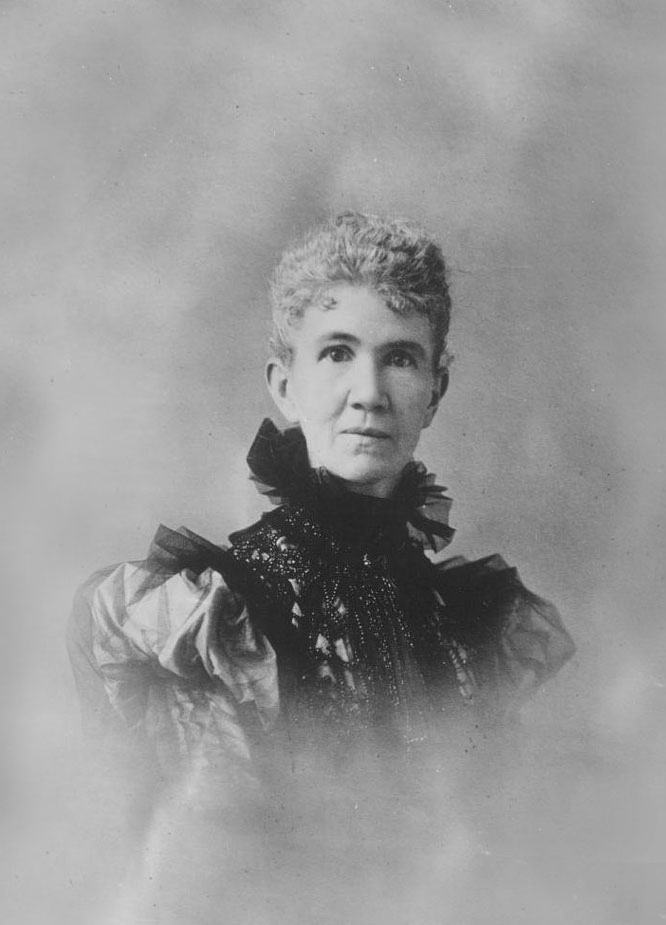Margaret Collier Graham – Foothills First Lady 1877 -1913
By Michele Zack
Our area was a cultural and literary vortex even before Altadena existed. Margaret Collier Graham was often at its center — attracting writers, artists, thinkers and luminaries as friends. She is buried in Mountain View Cemetery, and we are fortunate to have her literary light shining on us.
She, her husband Don, and sister Jenny arrived in the Indiana Colony in 1876, within two years of its founding; the college-educated pioneers’ first home was a tent pitched on seven and half acres on North Orange Grove. With $423 dollars they built their first home — the only one in the colony facing the mountains, instead of the street. “It was a bungalow, but we didn’t know it,” Maggie wrote later. “Everyone who passed stopped, and asked my husband why he didn’t set it with the compass.” Their liveliness and wit quickly endeared them to the community, and she and Jenny and Literary Society friends published The Reservoir, the colony’s first newspaper. In a letter home, Maggie commented: “most of the women in the colony are women’s rights women who agreed on the importance of keeping the issue alive.”
Don suffered from tuberculosis, which was the reason for their move west. From Iowa, and like most of early Pasadena, they were progressive-minded people who had supported the Union cause, abolitionism, and Temperance (to a degree.). Within a few years, this became the town that welcomed Owen and Jason Brown, their sister Ruth Brown Thompson, and husband Henry.
Owen was a long-time fugitive from the law, escaping after the raid on Harpers Ferry, Virginia, failed to start the slave rebellion his father, John Brown, had planned. Residents created a “safe space” for the outlaw, universally described as “shy and gentle.”
Don and Margaret were lovers of nature, and Don became the area’s first mailman. He made three trips a week to Los Angeles to pick up mail and passengers; during these, he was fond of reciting Shakespeare and Homer, and discussing the Latin roots of local place names. When a passenger suggested that as a stage driver, he must be able to “cuss awful,” Don replied with dignity that, to the contrary, he drove “a great moral hack.”
Margaret devoted herself to writing, and soon found success, publishing five stories in the Argonaut and Frank Leslie’s Popular Monthly, two early California periodicals, in 1877. Her prose, early examples of “social realism”, were said by the poet of the Sierra Joaquin Miller to be so Californian, “he could smell the sagebrush” in them. She also taught at Pasadena’s first school, where five of her students were Benjamin Eaton’s. Eaton was a founder of Pasadena, built the school, and lived on future Altadena land next to the canyon named for him — before moving to South Pasadena.
Maggie and Don also moved to South Pasadena, where Don, before he died in 1890 at age 42, became that city’s first mayor. As health permitted, he’d managed to become wealthy as the real estate developer of both Elsinore and Wildomar in Riverside County. They built a flamboyant and picturesque mansion, Wynyate (Welsh for Vineyard), in 1887, where Maggie held salons attended by litterati, local and visiting, every Sunday — long after Don’s death.
Mary Austin, western writer and high priestess of prose, California Poet Laureate Ina Coolbrith, Los Angeles Times flamboyant editor Charles Lummis; and naturalist John Muir all were regulars. Muir would set out from Wynyate on walkabouts lasting a few days, taking only bread and cheese with him. He wrote about his hikes in such places as the San Gabriels, where he camped in Eaton Canyon, calling its falls, lined with moss and ferns, “A little poem of wildness.”
After Don’s death, Maggie became as least as famous as most of her visitors, appearing in national publications such as Harpers and Atlantic Monthly. She published several volumes of short stories, including “The Wizard’s Daughter,” and wrote a monthly column for Land of Sunshine, discussing manners, morals, women’s issues, and the necessity of good taste.
Her lovely final resting spot in Mountain View Cemetery would have pleased her — she once wrote: “I have lived in California since 1876 and have in consequence no desire to go
to heaven.”


